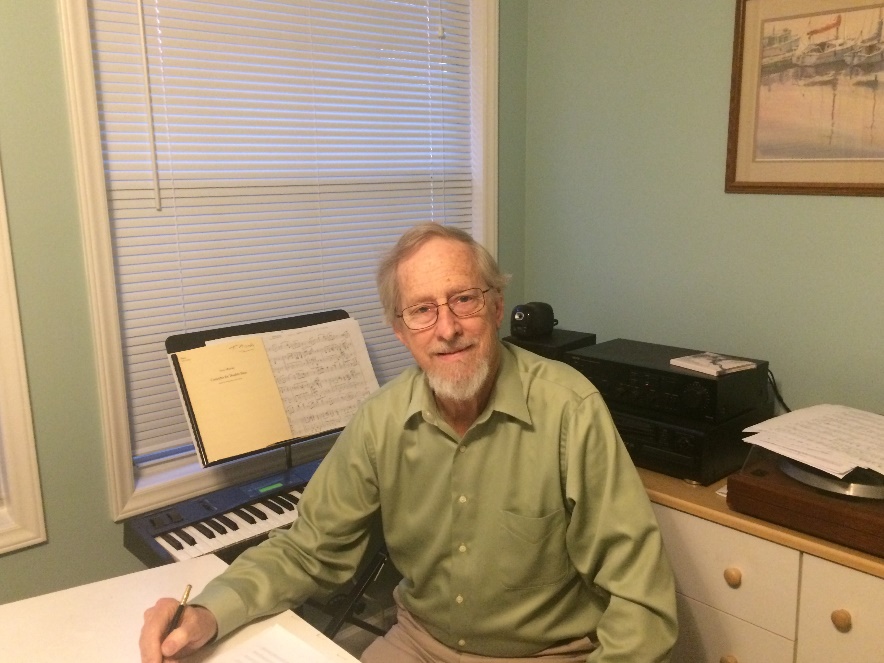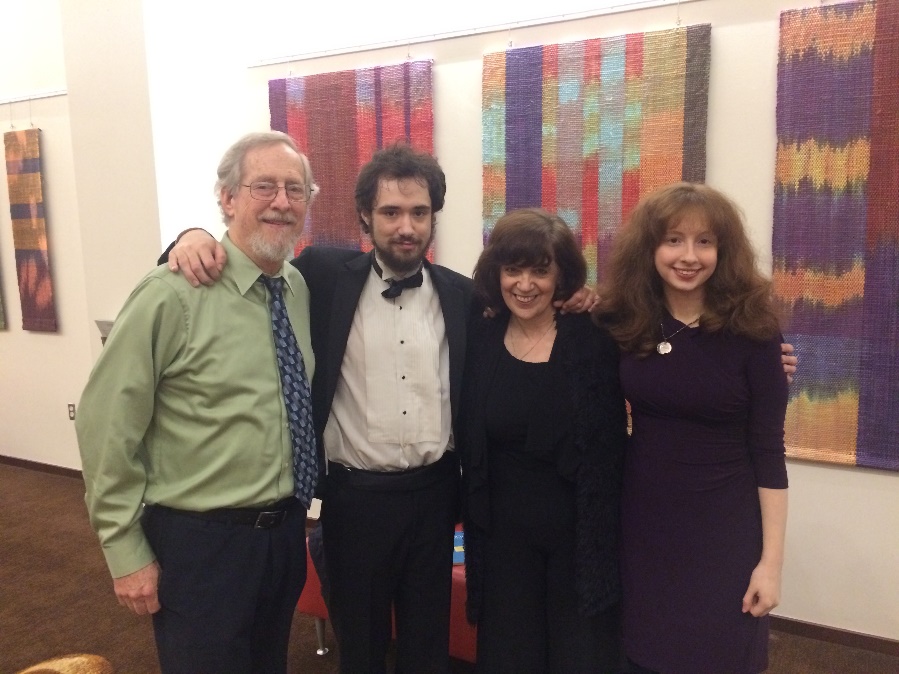Monday Musicale with the Maestro – November 16, 2020 – NC Composers, Part 2: Terry Mizesko
NC Composers, Part 2: Terry Mizesko
In the 1980s, while I was Resident Conductor of the Saint Paul Chamber Orchestra, I had the good fortune to encounter the music of American composer Dominick Argento. That week the local opera company had premiered his opera Casanova’s Homecoming, and I’d planned to catch the Sunday matinee performance. But I nearly missed it! At the time, I was also Associate Conductor of the Indianapolis Symphony and was commuting 11 hours (twice a week) between cities. I was 30 then—ah, youth! But work had been unusually challenging that week. So despite my interest in new music, a nap had begun to look more tempting than an opera by an unfamiliar composer. But then I recalled the lavish and unexpected praise given the piece by the Executive Director of the Saint Paul Chamber Orchestra. He’d seen an earlier performance and loved it, which was shocking to me since I knew he HATED contemporary music. Tired or not, I had to see for myself.
So I did go to the performance and came away stunned. It was a melodic, tonal, and accessible masterpiece! Since Argento was living in Minnesota at the time, I arranged to meet him and was thrilled to find that he was a warm and delightful person, much like his music.
Afterward, I studied several of his other works and conducted those I especially liked. And I was puzzled to observe that despite winning a Pulitzer Prize for one of his operas, he had not yet become a well-known composer. Some years later, while conversing with David Zinman, a marvelous American conductor and fervent champion of American music, I asked why Argento wasn’t being recognized as a master of his craft. “Argento will have to die first!” he replied. “Americans like their composers to be both dead and European.”
That is the prejudice against home-grown music which I’ve tried hard (as conductor) to fight with my programming. As I explained in last week’s Monday Musicale featuring Alan Hovhaness, the period from the early 1950s to the late 1980s was one when contemporary composers faced snap judgments and strong censure for daring to write something lyrical and beautiful, especially if it became popular. Such music was considered to be “old hat” or passé.
In the mid-1980s, for instance, when I conducted the world premiere of Joseph Schwantner’s Dream-Caller with the Saint Paul Chamber Orchestra, the audience response was rapturous. Yet several musicians in the orchestra (and two of my composer friends) noted this very thing as “proof” that the work was an artistic sell-out by the composer and was not likely to stand the test of time. Thirty-five years later, I assure you that it IS wonderful—yet indeed, it is sadly neglected. Even today, a composer who dares to please a broad audience is likely to be denied respect by academics.
But as I began suggesting to you last week, this is ludicrous. Without exception, there has never been a great composer in the history of Western music who did not find at some point his group of loyal fans!
So today, I’m introducing you to a North Carolina composer who deserves national attention—and yes, while he is still around for us to laud him and let him enjoy that praise!

Terry Mizesko was born on September 21, 1946, in Morehead City, North Carolina. He makes his home in Raleigh now, with two wonderful children, Josh and Elena, and his loving and supportive wife Sandy Schwarcz, a violist in the North Carolina Symphony. By a lovely quirk of fate, Sandy is also my dearest long-time friend! When we were teenagers, she played alongside me in the viola section of the Pittsburgh Youth Symphony, and we attended the Oberlin Conservatory together.

Terry has used the word hard-scrabble to describe the less-than-opulent community he grew up in. But like me, he had the incredible love of two great parents guiding him towards the Best. His mother was a church organist, and his father introduced him to classical music. By the time he was in his mid-teens, he was playing the trombone and the piano and dabbling in composition. He then studied music at East Carolina University (Greenville, NC), and upon graduation, he became a music teacher at a majority-African American high school. This was during a turbulent era when integration was being vigorously denounced by social conservatives.
Since coming to North Carolina in 1996, I’ve had interactions with high school and college students of all races. And I’ve been dismayed at the level of denial I’ve encountered about the state’s unsavory past and ill treatment of its African American citizens. The students seem largely unaware. Yet among other crimes, North Carolina (like all ex-Confederate states) saw frequent lynchings of African Americans where the white murderers were never prosecuted.
Terry remembers these stories, and he witnessed the rise of the Ku Klux Klan and the affront of white and colored drinking fountains. He grew up during a period where many small NC towns didn’t celebrate Independence Day (the 4th of July) because that was a “Yankee holiday.” I have always marveled at how people like Terry managed to grow up wholly free of racial prejudice despite the demonic elements surrounding him.
Another example of this is the case of my best friend, Daniel Huband, who grew up in Richmond, Virginia. He vividly recalls looking on in horror in 1968 (on the day after Martin Luther King was assassinated) as his high school classmates cheered and celebrated King’s murder.
I mention all this because as a witness to history, born one month after Brown vs. Board of Education, I must express my disillusionment at seeing one of our major political parties align with media outlets that stoke white resentment against people of color. I hope to see the end of these setbacks. However, my greatest sadness as an American is to discover in my seventh decade that the need for scapegoats trumps objectivity, altruism, and human decency. Kudos to my white brothers and sisters who continue to do honor to their patriot ancestors by courageously rejecting this.
Teaching at an all-Black school and beloved by his students, Terry continued to practice his principal instrument, the trombone. By the time he was in his mid-20s, he had become a virtuoso on that instrument and was rewarded with a prestigious position as Bass Trombonist in the North Carolina Symphony. In his first years with the orchestra, encouraged by the orchestra’s assistant conductor, Jack Parkhurst, he began to write short arrangements for the orchestra.
His first substantial composition was his Fantasy on Christmas Carols, an inspired first effort. Encouraged by this, he began writing original compositions and in the process discovered his own “voice.” Mizesko believes in writing melodic music that is instantly accessible. Despite current trends to the contrary, he has been true to his inner creative soul. Expression and simplicity are the hallmarks of his deeply sincere style. And as Beethoven said about one of his choral works, his music is written from the heart and is meant to go to the heart.
During my 20-year tenure as Resident Conductor of the North Carolina Symphony, I had the considerable joy of conducting the premieres for most of Mizesko’s major orchestral works. He has often thanked me for this, but I have always said in response, “Thank you, Terry, but I’m a conductor and therefore very selfish. I am doing your music for ME!” I love his music. And as a fellow composer, equally dedicated to the primacy of great melody, I fully understand his considerable achievement in weaving relatively simple threads into solid gold.
During my 11 years as Music Director of the Durham Symphony Orchestra, I have delighted the orchestra and our audiences with a half dozen of Mizesko’s works, including today’s featured piece, his Appalachian Lament, a work for solo French Horn and strings. Like several of his compositions referring to North Carolina regions, he avoids quoting actual folk songs, but bases his music on the various modes or intervals characteristic of those melodies.
Though Terry grew up in a coastal town, he has always been haunted by the majestic Appalachian mountains. Last week’s Musicale featured Hovhaness’ Symphony No. 2 (“Mysterious Mountain”), and like that work, Appalachian Lament is an homage not to a specific locale, but to the mountains as symbols of vastness—the lofty and mystical dimension of the world. Terry has said that in the Appalachian mountains he finds his “heart”: solace or spiritual refreshment. The lament in the title does not refer to a melancholy personal event, but rather to the poignant feelings one has in approaching something so permanent, grandiose, peaceful—and yes, mysterious.

As I have often said when introducing this work to my audiences, this is great American music. But it also, more importantly, is great music period.
Here, from the DSO’s NC and All that Jazz concert at the Carolina Theatre (2 April 2016), is our performance of Terry Mizesko’s Appalachian Lament. Joining us is the remarkable hornist Andrew MacAfee, who has had a varied career as a teacher, orchestral musician, soloist, and conductor. Andrew is a local treasure and one of the finest instrumentalists I’ve had the pleasure of working with.
William Henry Curry
Music Director
Durham Symphony Orchestra
Appalachian Lament – Mizesko
Durham Symphony Orchestra
Conducted by William Henry Curry
Andrew MacAfee, French Horn
NC Music & All That Jazz
The Carolina Theatre, Durham, NC 4/2/16
Celebrating Maestro Curry’s 50 years conducting &
11 years with the Durham Symphony!
Enjoying the Music?
 If you like what you’re seeing, please donate and let us know!
If you like what you’re seeing, please donate and let us know!
No matter the amount, we are grateful for your support and excited to bring you our music!!
Funding is provided (in part) by the Durham Arts Council’s Annual Arts Fund, the N.C. Arts Council (a division of the Department of Natural and Cultural Resources), and a grant from the Triangle Community Foundation.



